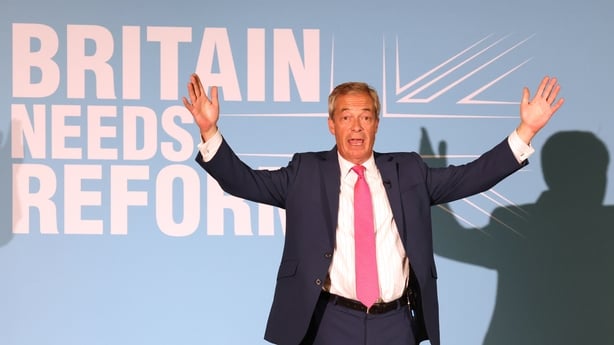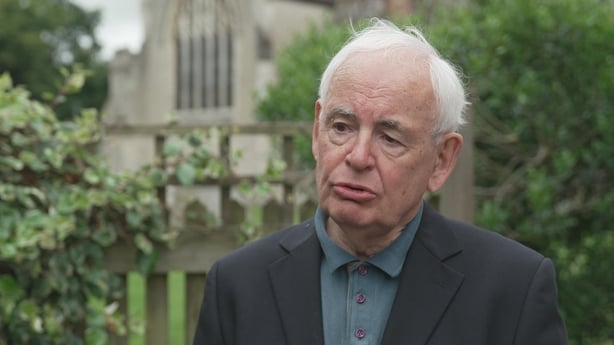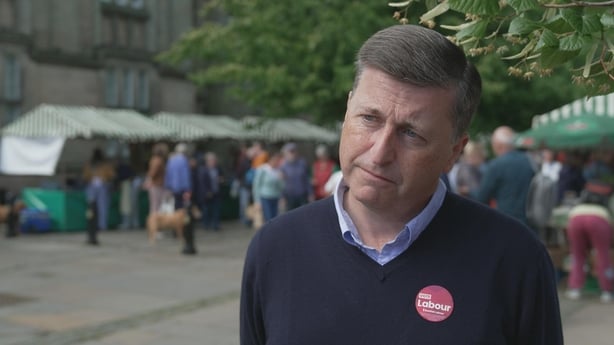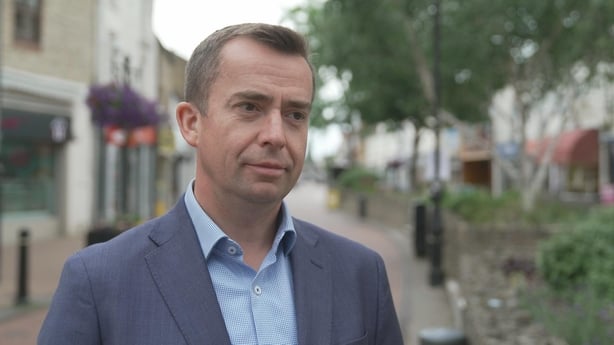Polling stations are open across the United Kingdom as voters prepare to cast their ballots in a general election for the first time since December 2019.
The Conservative Party has been in power for 14 years, but most election observers have predicted that it will be the Labour Party, led by Keir Starmer, that will come out on top.
The current parliament was formally dissolved on 30 May when incumbent Prime Minister Rishi Sunak called for a snap election.
Whatever happens across the next 24 hours, major political change is expected, and Prime Time's Fran McNulty has travelled from Edinburgh to London to speak to candidates and voters about the key election issues.
Labour will romp home, the Liberal Democrats could win more seats than the Conservative Party and Nigel Farage seems pretty confident his Reform UK party will take several seats in the House of Commons.
That’s the Westminster election in one line.
Reform UK’s leader Nigel Farage is beaming when we catch up outside an amusement arcade in his stronghold of Clacton, a jaded seaside town in Essex in England’s south east.
"We're doing well. We're going to get millions of votes," he told Prime Time.
Mr Farage hadn’t agreed to an interview in advance, but we spot him having a smoke at the top of a fire escape stairs at his campaign headquarters.
"We’re heading for the airport," I shout up at him as we prepare to dash for Stansted Airport at the end of a whistlestop tour of some key battlegrounds in the general election.
An exchange that will not be quoted ensued, and he agrees to speak to us on camera.
The former UKIP leader is fairly confident he will be elected in what is his eighth attempt to become an MP, but his confidence doesn’t end there.
"We’re gonna win a few seats in parliament," he told me before batting away questions about his divisiveness and controversies involving the language used by Reform UK supporters during his campaign.
Instead, he's keen to focus on the theme of ‘change’ comparing issues to the fore in Ireland with some of his key campaign talking points.
"There is a real appetite for change and just as you are having a big debate in Ireland, our population's risen by ten million since the year 2000. People can't get GP appointments. Kids can't get houses. Rents take up over half the income now of many working people," Mr Farage said.
"We literally cannot live with this population explosion yet. Neither of the so-called main parties appear to want to deal with it."
Nigel Farage has been saying the same thing day in day out for the last few weeks and his supporters repeat the lines.
They talk about Australia protecting its borders and no one having an issue with it. His plain speaking, populism will likely win the party a lot of votes and could cost his opponents multiple seats in the House of Commons.

Tory voter revolt
Since Mr Farage became leader of Reform UK on 3 June, his party has been polling well. They’re expected to contest strongly for at least 18 seats according to an opinion poll published on Thursday.
Much of those votes are expected to come from voters who would traditionally vote along conservative lines.
In the town of Bolton in England’s north-west, the turn against the Conservative Party is evident in a most unlikely of places — the Dunscar Conservative Club — a place where Tory voters come to socialise.
The club was opened by former Conservative MP Enoch Powell in 1973.
Powell’s rhetoric on immigration in the late 1960’s echoes still in Dunscar and elsewhere in the UK.
It is similar rhetoric to that which is winning Nigel Farage’s Reform UK party support amongst sections of the electorate.
"I’d probably go for Farage," one patron of the Dunscar Conservative Club tells me before adding the reason he’d vote for him is, "because he says it as it is."
Another patron says he’s voted for the Conservative Party his entire life, but he’ll be backing Reform UK on Friday because their leader "says things the public wants to hear."
Prime Minister Rishi Sunak’s snap election call caught the Conservatives in Bolton off guard.
Mark Logan, its outgoing MP in the Bolton North East constituency, defected to Labour and a popular local Tory councillor Adele Warren, who is standing for parliament in his place, considers herself to be the "underdog" in her bid for election.
Ms Warren says she is an unlikely Tory candidate having grown up in a council house. She also worked as a carer to put herself through university.
We join her on canvas where people criticise former Prime Minister Boris Johnson and her party’s leader Rishi Sunak.
"At the last door that I was speaking to, there was a feeling that the party is sometimes out of touch, especially in the north west. And a little bit of out of touch with common people," Ms Warren said.
"But I'm a common person and I'm not [out of touch]. And I think that's why it's important that you have the right people in the right places at the right times, doing the right job."
In Bolton, and elsewhere, the Tories could take a trouncing according to Professor Paul Whiteley from the University of Essex.
"It could be a political earthquake if you believe some of the new polling. One of them says that the Conservatives will get fewer seats than the Liberal Democrats. Labour will be way ahead," Professor Whitely told Prime Time.
The Professor of Government at the University of Essex says the rise of Reform UK is changing the political landscape.
"Reform is a real threat, and the polling suggests they could get the same vote share as the Conservatives. They won't get the same seat share because our electoral system is very different from the Irish one, but they could get the same vote share. In which case the Conservatives suffer from that something they've never faced," Professor Whitely said.

Labour’s revival
If, as is expected by Professor Whitely, Labour dominates today’s election, one former MP that will be returning to Westminster is Duncan Alexander.
Alexander, who served in the Cabinet under Prime Ministers Tony Blair and Gordan Brown, was among 40 Labour seats lost in Scotland during the 2015 general election.
This time round he’s targeting a seat in the Lothian East constituency that’s currently held by Alba Party leader Kenny MacAskill.
"It seats like this that we need to win as the Labour Party if Keir Starmer is going to be our Prime Minister on Friday morning," Mr Alexander told me while canvassing in the small market town of Haddington, around a half an hour from Scotland’s capital Edinburgh.
Like Nigel Farage and Reform UK, Duncan Alexander also expects the Labour Party to benefit from voters defecting from the Conservative Party.
"I'm encouraged by the response that we're receiving. We're finding both former Scottish Nationalists coming over to Labour and former Conservatives coming over," the former Cabinet Minister said.
Part of the reason for that change in voter loyalty is because voters want a change in direction according to Mr Alexander.
He believes that following a decade of politics being dominated by subjects like "identity" and "culture", there is a major appetite for a greater focus on the economy.
"My sense in this election is that economics is making a comeback. And that's partly why the Labour Party is in such a strong position as we head to the polls," he said.

That change that Douglas Alexander is speaking about is a constant refrain from Labour all over the UK.
But given the expected contraction of the Conservative Party vote, what is Rishi Sunak’s party doing to stem the tide?
Big data electioneering
Elections here are different to Ireland — there are no posters festooning every second lamp pole and candidates use a data bank to determine who voted for their party in the past and who may vote for them in the future and they knock on those doors.
The focus tends to be on targeting people you know to vote your party rather than the undecided.
Nadim Muslim is a Conservative Party councillor for Bolton and an election agent for his party in the area
"We've got a mobile app that has all the information that we need. It tells us how regularly people vote, when was the last time we canvased them, and what that their voting intention was. And then that gives us a bit more information that we can then use to target the right people," Cllr Muslim said.
This 2024 general election has been characterised as a digital election. Big data is driving the campaigns according to Cllr Muslim.
"I think we learned a lot, both us and the Labour Party from the [Barack] Obama [presidential] campaign in 2012. A lot of the work that they did in that campaign has been sort of imported into the UK so it's better use of social media, email addresses, phone numbers, as well as actually using mobile apps instead of just doing everything on paper," the Bolton Council representative told Prime Time.
Tactical voting
Another party looking to take advantage of the Conservative Party’s expected loss of seats is the Liberal Democrats.
Tactical voting websites advise voters on how best to vote to ensure the current Government is ousted and it’s a strategy being deployed by Lib Dems.
One of its most keenly fought seats is set to be in the newly formed constituency of Bicester Woodstock in Oxfordshire in England’s south east.
Parts of the constituency were once areas that elected former Conservative Prime Ministers David Cameron and Boris Johnson, but the Lib Dems have it in their sights this time round despite its traditional Tory connection.

Party leader Ed Davey has made two visits here in the last few weeks. The party is hoping to elect Callum Miller, a senior fellow at Oxford University's School of Government and a former senior civil servant in the Cabinet Office, the Foreign Office, and the Treasury.
There’s a good chance he will be elected to parliament along with many other Lib Dem members.
"We hope to do a lot better than last time round and I think the polls would support that," Cllr Miller, who is a member of Oxfordshire County Council, told Prime Time.
"We were very disappointed only to have 11 MPs return the last time round. We gained four in by elections, but we've been looking for a much higher total than that this time around. Our goal would be to return to being the third largest party in UK politics," Cllr Miller added.
Fran McNulty and producer Sallyanne Godson's report will be broadcast on the 4 July edition of Prime Time on RTÉ One and the RTÉ Player.






